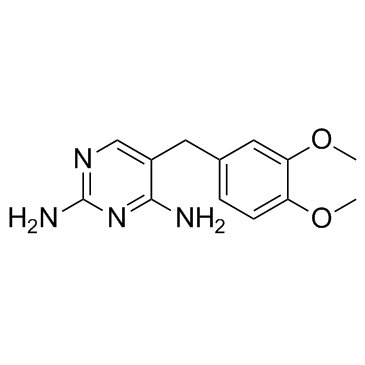Diaveridine (EGIS-5645) (Synonyms: NSC 408735) |
| Catalog No.GC32343 |
디아베리딘(EGIS-5645)(EGIS-5645)은 야생형 DHFR에 대한 Ki가 11.5nM인 디히드로폴레이트 환원효소(DHFR) 억제제이자 항균제입니다.
Products are for research use only. Not for human use. We do not sell to patients.

Cas No.: 5355-16-8
Sample solution is provided at 25 µL, 10mM.
Diaveridine (EGIS-5645) is a dihydrofolate reductase (DHFR) inhibitor with a Ki of 11.5 nM for the wild type DHFR and also an antibacterial agent.
Diaveridine is a dihydrofolate reductase (DHFR) inhibitor with a Ki of 11.5 nM for the wild type DHFR and also an antibacterial agent[1]. Treatments with Diaveridine for 90 min have a strong bactericidal effect on S. typhimurium TA1535, and no bacterial growth is observed at 10μg/mL or more. Without metabolic activation, treatment with Diaveridine for 48 h, but not 24 h, causes a dose-dependent, significant increase in the frequency of aberrant metaphases. At 100 μg/mL, 60% of the metaphases contain chromosome aberrations[2].
The sperm abnormality of the Diaveridine (DVD) treatment groups at all dose levels (Diaveridine, 128 to 512 mg/kg) shows no significant differences compare with the negative control group. There are no significant differences of micronucleus between the negative control group and the Diaveridine treatment groups (Diaveridine, 128 to 512 mg/kg). The chromosome aberration of the Diaveridine treatment groups at all dose levels and the negative control group are significantly lower than those in the positive control group treated with cyclophosphamide (P<0.05), indicating that Diaveridine at the doses studied does not cause abnormal chromosome aberration. The results demonstrate that the Diaveridine administration does not produce significant changes in the ratio of organ-to-body weight, compare with the negative control group in the end period of the study[3].
[1]. Sirichaiwat C et al. Target guided synthesis of 5-benzyl-2,4-diamonopyrimidines: their antimalarial activities and binding affinities to wild type and mutant dihydrofolate reductases from Plasmodium falciparum. J Med Chem 47:345-54 (2004). [2]. Ono T, et al. The genotoxicity of diaveridine and trimethoprim. Environ Toxicol Pharmacol. 1997 Sep;3(4):297-306. [3]. Wang J, et al. Acute, mutagenicity, teratogenicity and subchronic oral toxicity studies of diaveridine in rodents. Environ Toxicol Pharmacol. 2015 Sep;40(2):660-70.
Average Rating: 5 (Based on Reviews and 10 reference(s) in Google Scholar.)
GLPBIO products are for RESEARCH USE ONLY. Please make sure your review or question is research based.
Required fields are marked with *




















